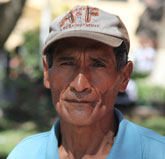 I love the idea that we can buy produce here that makes a real difference to the people who make it.
I love the idea that we can buy produce here that makes a real difference to the people who make it.
The whole "Fair Trade" movement is built on this ideal. But "Fair Trade" (with capital F, capital T) is only one way to do it. The Fair Trade organisation is a brand. They've found a way to create markets for products from the developing world in such a way that the producers are paid a premium for it. But at the end of the day, they're only one brand that has this objective. There are lots of things you can buy, that don't have a blue-green logo on, that are just as much "fair trade" (small f, small t).
It's actually all quite complex. The economics of what we mean by "fair", and of what kind of premium system brings the best genuine help to producers, is far from straight forward.
Which is why I think you can't beat a relationship between the grower / manufacturer and the importer / buyer. It's often hard to do this. The official "Fair Trade" approach always works through co-operatives, which have the effect of anonymising everything. Even without that, the scale of most commercial transactions makes it very hard to keep things traceable, and to build real relationships.
With that preamble, I'd like to introduce you to David Vilca, who runs a coffee farm in Bolivia. I don't know him myself, but my friend Steve Leighton does. I'd love readers of this blog to do two things:
First, go and read the story of Steve's visits to David's farm over several years. It's a great tale.
The second, go and buy some of the Caturra-varietal, washed-process coffee from David's farm. Because by doing that, you're actually helping David to hear what people say to him.
Recent comments